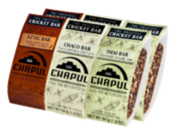 I spent 30+ years at Oscar Mayer and parent company Kraft Foods. At that time, Kraft was the largest food company in the Western hemisphere and the most profitable in world. Kraft was a new products juggernaut introducing thousands of new or changed products every year. Much of my career had something to do with developing new products: either typical NPD work on a project team or improving Kraft’s global new product development process. I learned a few things about innovation during that time.
I spent 30+ years at Oscar Mayer and parent company Kraft Foods. At that time, Kraft was the largest food company in the Western hemisphere and the most profitable in world. Kraft was a new products juggernaut introducing thousands of new or changed products every year. Much of my career had something to do with developing new products: either typical NPD work on a project team or improving Kraft’s global new product development process. I learned a few things about innovation during that time.
For example, even close-in or relatively minor improvements or changes to a product, a formulation change or packaging modification for example, can be difficult to commercialize without issues.
Actual new products, things Kraft hadn’t done before, like low sodium or light products, proved to be very difficult.
And creating a new category of products, like Lunchables, was extremely difficult to do and most attempts failed before ever seeing the light of day.
But starting from scratch to introduce a new product that was so new to the world that there was no ingredient supplier, no infrastructure, no production methods, no retailer to shelve the product, and a consumer mindset that was actually antagonistic toward the idea, that kind of innovation would NEVER happen. Never. Ever. Not in a million years.
But it is happening somewhere else. Not in a big food company or on a grand scale yet. Big companies almost never take that kind of risk. Instead, it’s happening in the labs and kitchens of entrepreneurs… the people who want to, and likely will, change the world.
This past week, I had the honor of moderating a scientific session at the 2014 Institute of Food Technologists Conference in New Orleans. The subject: Real Pioneers: Experience with Insect Ingredient, Processing, Products, and Marketing.
Three very smart, passionate, visionary pioneers were on the panel. Dr. Aaron Dossey, a Ph.D. in Biochemistry and Molecular Biology turned entrepreneur and founder of All Things Bugs, is focused on commercializing the insect ingredient, crickets, for broad use in a number of different product forms. All Things Bugs is the only pure cricket and mealworm powder wholesaler in North America. His project has been funded by the Bill and Melinda Gates Foundation, which should keep his efforts going for the next couple of years. (The life of an entrepreneur: “Can I make it to the next milestone before running out of money?”)
Laurie Keeler, the Senior Manager for Food Product Development at the Food Processing Center for the University of Nebraska, focuses on ingredient functionality and product prototyping. She too has an entrepreneurial spirit and works tirelessly in the pilot plant creating, testing, creating some more, and working with government regulators to assure products are perfectly safe for human consumption. On top of all that and her other work too (she provides pilot plant prototyping work for companies), Laurie made this IFT Symposium happen.
But the commercialization of insect protein into the U.S. food system wouldn’t be complete without an entrepreneur that’s willing to take the idea to market. Meet Pat Crowley, founder of Chapul (from the Aztec word for ‘cricket’). Pat has a compelling vision for a new sustainable protein source for the world; one that will revolutionize the marketplace. And he’s just the guy to get it done. An adventurous outdoorsman from Salt Lake City, Pat was recently on the primetime ABC show Shark Tank where he convinced a shark, Mark Cuban, to join him in “feeding the revolution” (see below). It takes a person like Pat to step up and face the highly emotional responses of consumers and overcome the “ick” factor to convince them that crickets really can be a good, nutritious food source. So far, it’s working. Chapul bars in three flavors can now be found in numerous stores and business is profitable and expanding. You can get yours here.
Innovation comes in all shapes and sizes. We use the word so loosely now that practically anything can carry the label. But it takes special people to make real innovation happen. And let’s be clear about what these three ‘real pioneers’ are doing. This is innovation. This is overcoming countless barriers and obstacles. This is passion. This is visionary. This is something NO big food company would ever do. It may take awhile. So did sushi. So did lobster. But these people are making it happen. Crickets: food for entrepreneurial champions.